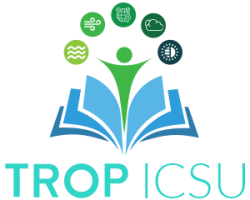Water Vapour Feedback and Earth’s Climate

Water Vapour Feedback and Earth’s Climate Reading A reading that explains the phase diagrams of water on Earth, Mars, and Venus and discusses the water vapor feedback mechanism in the atmospheres of these planets that influences the greenhouse effect. Students will be able to explain the concept of water vapor feedback on Earth’s atmosphere by […]
The Geologic Carbon Cycle and Earth’s Climate

The Geologic Carbon Cycle and Earth’s Climate Model/Simulator A model/simulator to learn about the geologic carbon cycle and its role in stabilizing the Earth’s climate. Students will run the model after configuring parameters such as the CO2 degassing rate, the existence of land plants, and the relative land areas. They will observe and analyze plots […]
Orbital Forcing and Earth’s Climate

Orbital Forcing and Earth’s Climate Teaching Module A set of classroom/laboratory activities to reconstruct Earth’s past climate using isotopic composition data from ice cores and to highlight the influence of orbital forcing and atmospheric carbon dioxide feedback on Earth’s climate. Students will reconstruct Earth’s past temperatures by plotting graphs of isotopic compositions from ice cores […]
Oceans, Ocean Circulation and Sea Surface Temperatures

Oceans, Ocean Circulation and Sea Surface Temperatures Video A video lecture by Raghu Murtugudde, University of Maryland that introduces basic concepts in oceanography. This video lecture is part of a MOOC titled ‘Climate Change’ and has been developed by the National Resource Centre on Climate Change at the Indian Institute of Science Education and Research […]
Feedback Mechanisms

Feedback Mechanisms Teaching Module A teaching module titled ‘Feedback mechanisms’ from the e-learning course titled ‘Earth in the Future’ developed by Timothy Bralower and David Bice, The Pennsylvania State University. This module discusses the various feedback mechanisms and is listed in Module 3: Earth’s Climate System of the e-learning course. This overview reading can be […]
If Global Temperature Rises by 4 C

If Global Temperature Rises by 4℃ Model/Simulation An interactive Model/Simulation to observe the effects of a global temperature increase of 4°C on human health, agriculture, forests, oceans and marine ecosystems, permafrost, water availability, and extreme climate events. Students will observe and discuss how a global temperature rise of 4°C will affect different regions in the […]
Milankovitch Orbital Parameters

Milankovitch Orbital Parameters Model/Simulation A Model/Simulation to learn about changes in Earth’s climate caused by variations in the solar energy received by the planet over geological time scales and to understand the role of the orbital parameters (obliquity, precession, and eccentricity) in causing ice age cycles (Milankovitch cycles) on Earth. Students can vary orbital parameters […]
Biogeochemical Cycles and Climate Change

Biogeochemical Cycles and Climate Change Teaching Module A teaching module that discusses the carbon cycle and the nitrogen cycle. This reading by University The Corporation for Atmospheric Research (UCAR) describes the 2 cycles and details how the components are cycled through different parts of the Earth- atmosphere, biosphere, lithosphere, and hydrosphere. Students will be introduced […]
The Science and Modeling of Climate Change

The Science and Modeling of Climate Change Online Course An e-learning course to learn about the science of climate change, simple climate models, natural factors and human activities that influence climate, and options to mitigate climate change. Students will perform exercises and activities to model the greenhouse effect, various feedback mechanisms that influence climate, the […]
Ancient Civilizations and Climate Change

Ancient Civilizations and Climate Change Video A video lecture by Raghu Murtugudde, University of Maryland, on the historic record of human activity from the start of the Holocene period, 11,000 years ago, to the Little Ice Age. This video lecture is part 2 of a 3-part lecture series titled ‘Climate Change on Historic Timescales’ of […]


